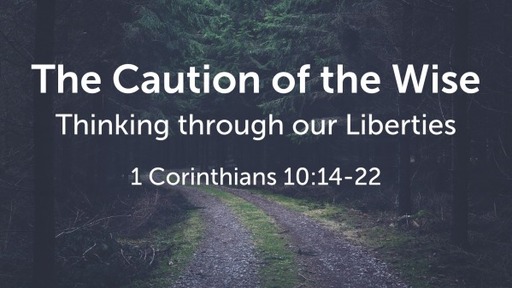The Caution of the Wise

I. Issues with Idolatry
I(A). Offense to God
idolatry is worshiping something other than the true God in the true way, it is the most serious and contaminating of sins. It strikes at the very character of God. Those who worship an idol declare that the Lord is not the only true God and that other “so-called gods” (8:5) are worthy to share His glory and honor. They testify that the Lord is deficient, that He is not all-wise, all-powerful, and all-sufficient.
Idolatry does not begin with a sculptor’s hammer; it begins in the mind. When we think of God we should visualize absolutely nothing. No visual conception of Him could properly represent His eternal nature and glory.
I(B). Harmful to Man
II. Issues with Convictions
II(A). Think through it Logically (v. 16-20)
When we properly share in Communion we spiritually participate in fellowship with Jesus Christ and with other believers. It is much more than a symbol; it is a profound celebration of common spiritual experience.
Celebrating our common salvation and eternal life is the ultimate fellowship of believers while we are on earth, and reflects the perfect fellowship we will have in heaven.
Again Paul uses Israel to illustrate his point. Are not those who eat the sacrifices sharers in the altar? When the Israelites sacrificed to the Lord, some of the offering was burnt as the sacrifice proper, some of it was eaten by the priests, and some was eaten by those who offered it. Everyone was involved with the offering, with God and with each other.
II(B). Think through it Biblically (v. 21-22)
Demons can exhibit considerable power. Many cultic and pagan religious claims are faked and exaggerated; but many are true. They are evil but true.
Demons are not unlimited in power, but they have power to perform enough wonders and to make enough predictions come true to keep superstitious worshipers deceived and loyal (cf. 2 Thess 2:9–11).
It is not simply that we should not but that we cannot. It is impossible to do both at the same time. It must be one or the other. We will “hate the one and love the other,” or we will “hold to the one and despise the other.” When we fellowship with the Lord we cannot also fellowship with demons, and vice versa. Some attempted it in Corinth, but they were not truly fellowshipping with the Lord. Their worship was hypocrisy.
Christians are not immune from the influence of demons. When we willingly ignore the Lord’s way and flirt with the things of Satan by setting up idols of any kind, we open ourselves up to demonic influence. In rebuking Ananias, Peter said, “Why has Satan filled your heart to lie to the Holy Spirit?” (Acts 5:3). Through the idol of their greed, he and his wife, Sapphira, left themselves open to being corrupted by the chief of demons. It is clear from our wrestling with demons (Eph. 6:12) that there is some intimate contact between believers and those vile fallen angels.
